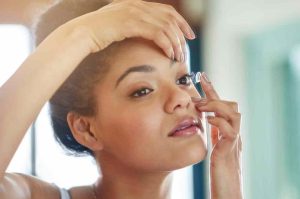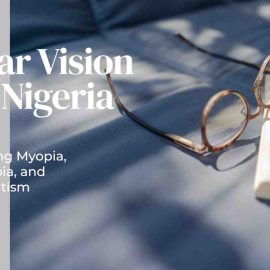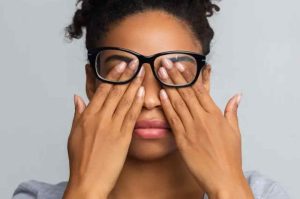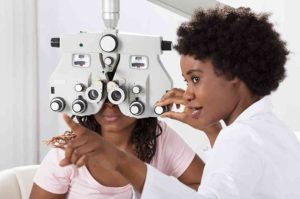Managing Myopia, Hyperopia, and Astigmatism in Nigeria
Do you squint to see distant objects? Perhaps nearby details appear blurry? These could be signs of common vision problems like myopia (nearsightedness), hyperopia (farsightedness), and astigmatism. In Nigeria, with its vibrant mix of urban landscapes and natural beauty, clear vision is essential for navigating daily life. This comprehensive guide empowers you to understand and manage these refractive conditions effectively.
Shining a Light on Refractive Errors: Myopia, Hyperopia, and Astigmatism
Our eyes rely on a delicate balance between the cornea and lens to focus light precisely onto the retina, creating clear vision. Refractive errors occur when this focusing mechanism is disrupted, leading to blurry vision at various distances. Here’s a breakdown of the three most common refractive errors:
- Myopia (Nearsightedness): Light focuses in front of the retina, causing distant objects to appear blurry. This is the most prevalent refractive error globally, affecting millions.
Fun Fact: Myopia is often nicknamed “nearsightedness” because people with this condition can see nearby objects clearly but struggle with distant vision.
- Hyperopia (Farsightedness): Light focuses behind the retina, making nearby objects appear blurry. While less common than myopia, hyperopia is still a significant vision problem.
Did You Know?* Hyperopia can sometimes go unnoticed in children, as their eyes have a natural ability to adjust focus (accommodation). However, as adults, this ability weakens, and hyperopia becomes more apparent.*
- Astigmatism: The cornea or lens has an irregular curvature, causing distorted vision at all distances. Astigmatism can often co-occur with myopia or hyperopia.

Facts and Figures on Refractive Errors in Nigeria
- According to a National Eye Institute [invalid URL removed] report, myopia rates are rising globally, with a significant impact on developing countries like Nigeria.
- A Nigerian Journal of Ophthalmology study highlights the prevalence of uncorrected refractive errors as a major public health concern in Nigeria.
Symptoms and Early Detection: When to See an Eye Doctor
Early detection and management of refractive errors are crucial for maintaining good vision health. Here are some common symptoms to watch out for:
- Blurred vision at near or far distances
- Squinting to see clearly
- Headaches or eye strain
- Difficulty seeing at night
If you experience any of these symptoms, schedule a comprehensive eye exam with a qualified ophthalmologist or optometrist. Early diagnosis allows for prompt treatment and helps prevent potential complications.

Treatment Options for Myopia, Hyperopia, and Astigmatism in Nigeria
Fortunately, numerous effective treatment options are available to manage these refractive errors:
- Eyeglasses and Spectacles: The most common and widely accessible solution. Corrective lenses in eyeglasses or spectacles bend light rays to focus them accurately on the retina, restoring clear vision.
- Contact Lenses: Offer a more flexible alternative to eyeglasses. Rigid gas permeable (RGP) or soft contact lenses can correct refractive errors and provide a wider field of view.
- LASIK Surgery: A laser vision correction procedure that reshapes the cornea to improve focusing ability. This is a permanent solution for some individuals, but careful evaluation by an ophthalmologist is crucial to determine candidacy.
Beyond Spectacles: Additional Considerations for Managing Vision in Nigeria
While corrective lenses are a mainstay of treatment, here are some additional tips for managing your vision health in Nigeria:
- Maintain Good Eye Hygiene: Regularly wash your hands before touching your eyes and clean your eyeglasses or contact lenses as instructed by your eye doctor.
- Protect Your Eyes from UV Rays: Wear sunglasses that block UVA and UVB rays to shield your eyes from sun damage, which can contribute to vision problems.
- Maintain a Healthy Diet: Consume a balanced diet rich in essential vitamins and minerals, including Vitamin A, which is crucial for eye health.
- Regular Eye Exams: Schedule regular eye checkups with your ophthalmologist or optometrist, even if you don’t experience any problems. Early detection of changes in your vision or potential eye diseases is vital for maintaining good eye health throughout your life.
- Addressing Access to Care: The availability and affordability of eye care services can be a challenge in some parts of Nigeria. Consider government initiatives or NGOs that offer subsidized eye care services or raise awareness about the importance of vision health in your community.

The Future of Vision Care in Nigeria: Innovation and Accessibility
Advancements in technology offer promising prospects for improving access to vision care in Nigeria:
- Teleophthalmology: Utilizing telecommunication technology allows remote consultations with eye specialists, expanding access to care in underserved areas.
Important Note:* Teleophthalmology should not replace in-person eye exams entirely, but it can be a valuable tool for initial consultations and follow-up care.
- Mobile Eye Clinics: Mobile eye clinics equipped with diagnostic tools and basic vision correction options can bring essential eye care services directly to local communities.
- Affordable Eyewear Initiatives: Partnerships between NGOs and eyewear manufacturers can make corrective lenses more affordable and accessible to low-income communities.

Conclusion: See the Beauty of Nigeria Clearly
By understanding and managing refractive errors, you can unlock a world of clear vision, allowing you to appreciate the vibrant tapestry of Nigerian life in all its detail. Schedule regular eye exams, prioritize good eye hygiene, and explore available treatment options. Remember, early detection and proactive care are essential for maintaining optimal eye health throughout your life.
Let’s work together to ensure that everyone in Nigeria has the opportunity to see the beauty of their surroundings with clarity and confidence.







